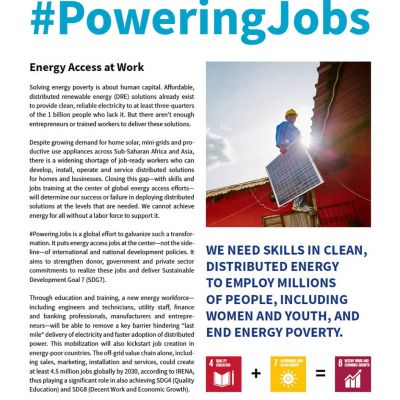Only a third of the main health facilities in rural areas in Zambia have a functional connection to the grid. Therefore, the health care of more than 60% of the rural population is adversely affected. In this Action Plan, the Government of Zambia calls upon all stakeholders, including development partners and the private sector, to join its efforts to electrify country's health facilities.
In this open letter, The Ministry of Health (MoH) and the Ministry of Energy (MoE) call on funders and implementing agencies to coordinate efforts and pool resources to support government initiative to scale up the electrification of health facilities effectively and efficiently.
The Utilities 2.0 Twaake project in Uganda is a collaboration between centralized and decentralized energy companies including East Africa Power, EnerGrow, Equatorial Power, Power for All, Umeme, The Rockefeller Foundation among other partners with a goal to bring faster connections, increase productive use of electricity, improve grid reliability and stability, reduce grid losses, promote economic growth in rural communities, and improve business profitability.
In support of the 2021 High-Level Political Forum and the High-Level Dialogue on Energy, Power for All contributed to the fourth edition of the SDG7 Policy Briefs, authoring the brief on SDG17: Sustainable Development Through Global Partnerships, and contributing to the briefs on SDG2: Zero Hunger, and SDG8: Economic Growth and Employment. Read and share the full brief on partnership.
Powering rural health care with distributed clean energy.
Power for All released Powering Jobs Census 2019: the Energy Access Workforce, the first annual jobs census measuring employment from decentralized renewables for rural electrification in Africa and Asia. This policy brief draws out key messages and evidence on how employment can be fostered through the decentralized renewable energy sector, and provides recommendations for policy-makers.
For mini-grids to attract private investment, they require consistent, reliable, and rapidly deployable Results-Based Financing (RBF) programs. This paper was prepared by the signatory investors to present a unified message of support for these RBF programs to donors.
Based on input from a diverse set of sources including the Mini-Grids Partnership (MGP) steering committee and the Africa Mini-grid Developers Association (AMDA), this guide is a reference tool to help various stakeholders understand the importance of the global mini-grid sector. With this guide, sector stakeholders, including businesses, funders, government and civil society, should be able to easily discuss mini-grids at a high level or in-depth, using clearly sourced evidence.
#PoweringJobs is a global campaign to ensure the required energy access workforce exists, and has the necessary skills to achieve sustainable energy for all. Women and youth are a core focus of this advocacy campaign.
This collaboration between Power for All, SNV, Hivos and Practical Action aims to work with 25 countries to stimulate last-mile electrification markets and end energy poverty by 2025, hence "25x25". Many national governments have the political will to address rural electrification, but often lack the resources and capacity.
Nigeria has one of the greatest energy access challenges in the world, with an unelectrified population of 75 million people (SE4ALL, 2015). Decades of policy focused on grid expansion have not only failed to deliver improvements in energy access; they have failed to keep up with population growth. The unelectrified population has grown from 44 million in 1990 to 75 million in 2015—an increase of 70%. The cost of the energy access deficit is huge, and is borne by households, businesses and the government.
Power for All worked with REASL to develop Sierra Leone’s first-ever recommendations from a renewable energy industry association, following a series of workshops focused on developing REASL’s governance structure, strategy and plans.
Power for All and 24 partners and allies from across the decentralized energy sector have sent a letter to Dr. Akinwumi Adesina, President of the African Development Bank (AfDB), urging him to fill the newly created role of Vice President, Power, Energy and Green Growth—who will lead the Transformative Partnership on Energy—with an "outside-the-box" thinker who has a keen understanding of new business models and the vital role that innovative, distributed renewable technologies must play in achieving universal energy access. The letter comes after Power for All found that knowledge of distributed energy solutions was not highlighted in the role-criteria which the Bank recently advertised in the Economist.
Power for All and 24 partners and allies from across the decentralized energy sector have issued a letter to Dr. Jim Yong Kim, President of the World Bank Group, urging him to ensure that the successor to Anita Marangoly George, the Senior Director of Energy and Extractives Global Practice, has a strong understanding of new business models and innovative, disruptive technologies such as decentralized renewables. Ms George recently retired and her replacement is currently being sought.
Type:



























